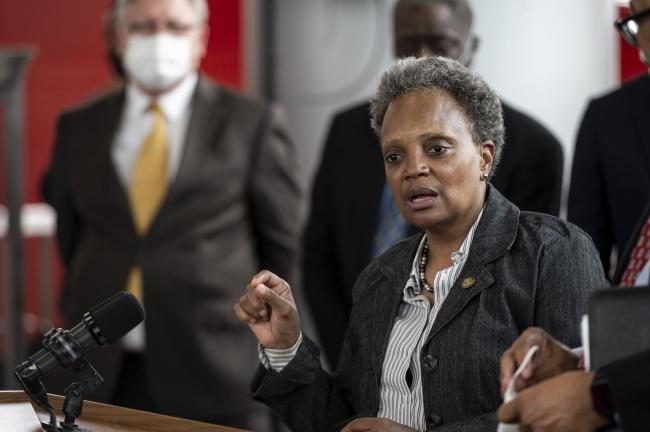(Bloomberg) -- Chicago Mayor Lori Lightfoot is proposing a $16.7 billion budget for the coming year that uses federal aid to close a $733 million deficit as she tries to spur a strong recovery from the pandemic for the third-largest U.S. city.
About $385 million of the $1.9 billion in American Rescue Plan Act funds Chicago is getting from the federal government will be used to balance the 2022 budget, as well as $24.9 million from a tax increment financing surplus and $81.2 million in new property growth and improved revenue projections, Lightfoot said during a presentation at city hall on Monday. The mayor plans to tap $298.2 million in savings and efficiencies but is proposing no new taxes, reduction in city services or layoffs, she said.
“This gap closure strategy both builds on and is the result of a number of accomplishments we’ve racked up in our journey toward structural balance,” Lightfoot said. “We expect to reach structural balance by 2023, which bodes especially well for our prosperous, post-pandemic recovery.”
Yellen Is Urged to Block Cities From Using Aid for Debt
Lightfoot is also proposing spending $1.9 billion on investments that include dollars for affordable housing, mental health, violence prevention, environmental justice, youth services and workforce and small business support. That’s part of the so-called “Chicago Recovery Plan,” a strategy for how the city will respond to the impacts of Covid-19 and bolster its economic recovery.
“Our economy is definitely on the mend,” Lightfoot said.
Cash Assistance
The Chicago Recovery Plan includes a $157 million investment for immediate financial assistance programs such as a pilot for a monthly cash assistance program “for hard-hit, low-income households.”
The plan is expected to help create more than 40,000 jobs, connect 100,000 residents to mental health support, clean at least 4,000 vacant lots, plant 75,000 trees, create and preserve more than 4,000 affordable housing units and support over 175 new community amenities, including grocery stores, commercial spaces and parks.
These efforts will go toward addressing one of Lightfoot’s biggest challenges for the upcoming year: balancing the needs of residents hardest hit by the pandemic while addressing the city’s financial situation. Chicago’s fortunes, like those of state and local governments across the U.S., shifted with revenue rising amid a broader economic recovery and a one-time influx of federal aid. All that money also sparked a debate over how to use it.
A group of aldermen have proposed dividing up the federal aid for items such as child care, affordable housing, mental health services and guaranteed basic income rather than easing the city’s stressed finances. Many of Chicago’s lower income and minority neighborhoods have suffered under-investment, high unemployment and poor health care for decades. The pandemic exacerbated both. The council will vote on Lightfoot’s plan later in the year.
‘Cautiously Optimistic’
“I am cautiously optimistic that we’ve been heard as a city, as a community, as a lot of people who have been hurting,” said Alderman Daniel La Spata, who has advocated for using American Rescue Plan funds for community investments. “We see the investments we’ve been talking about reflected in here. The challenge is going to be digging into the numbers.”
Late PPP Loans Hurt Recovery in Chicago’s Minority Neighborhoods
Chicago’s enacted budget for 2021 plugged a $1.2 billion hole in its corporate fund, the main operating fund through which the city pays for services from policing to tree trimming, with tax increases and a planned refinancing this year that has been canceled amid rising revenue. For 2020, it had closed a nearly $800 million gap. The city, rated junk by Moody’s Investors Service, also has more than $31 billion in unfunded pension liabilities and is ramping up payments for its four plans.
“In the 2022 budget, the city will have finally climbed the pension ramp for all four of the City’s pensions funds,” which means it can start investing in infrastructure needed for economic growth and improvement of quality of life, Chief Financial Officer Jennie Huang Bennett said in a statement. “These are incredible financial accomplishments for the City, especially when you layer on over $1 billion in structural solutions over the last three years, a forthcoming casino and recovering revenues from a one in a lifetime pandemic.”
©2021 Bloomberg L.P.

